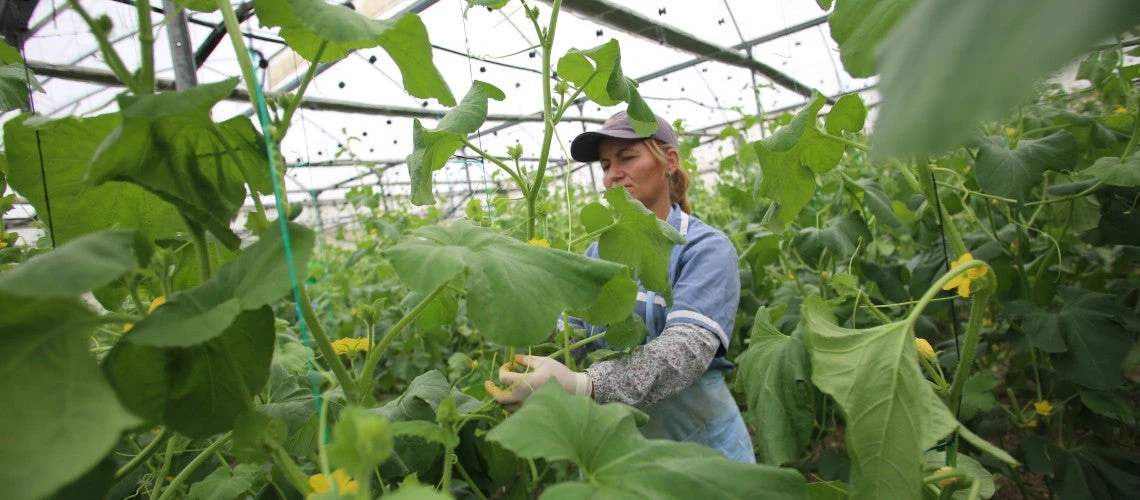 Woman farmer in Albania
Woman farmer in Albania
In Albania, the agricultural sector has long played a pivotal role in driving employment and economic growth. Currently, the sector constitutes nearly 20% of GDP – almost three times higher than the regional average for Western Balkan countries – and is a key source of employment, providing jobs for over 40% of the population. At 11.3%, agricultural and food products also represent a sizable share of total exports.
Despite a steady increase in agricultural output over the past several decades, the country continues to trail behind its neighbors. The seemingly obvious obstacles preventing progress include land fragmentation, underinvestment in rural infrastructure and services, uncertain land property rights, limited access to finance, and a dearth of market-relevant knowledge and skills.
An estimated 359,000 farms with an average size of about one hectare – often broken into even smaller parcels – dot the Albanian countryside. This high level of fragmentation directly contributes to low marginal productivity, as farmers are unable to exploit economies of scale in production, logistics, market information, and knowledge management. Another severe constraint is the limited production capabilities, perpetuating the use of inefficient inputs and processes, and further undermining the marginal productivity of Albanian farms.
Modernizing land management
Currently, 10% of land titles are digitally registered, while 80% are registered in paper format only. Ten percent are not registered at all. The lack of land titles and registration documents makes it challenging for farmers to access financing, exacerbating underinvestment and heightening the risks associated with inadequate working capital. Moreover, registration documents alone do not confer proof of ownership due to inconsistencies between registration and cadastral data. This can result in conflicting ownership claims, further heightening uncertainty.
To address this challenge, improving the quality of existing land data is imperative. All agricultural land and cadastral data should be digitally registered, and a unique digital cadaster map should be created for use by surveyors, government agencies, and municipal authorities. Also, focusing on training a new generation of land professionals in modern registration methods and sustainable land management will be essential in the long term.
Enhancing access to finance
Although the agriculture sector contributes almost 20% to GDP, according to the data from the Central Bank of Albania, it receives less than 3% of banks` lending. A significant portion of the rural population lacks access to formal financial institutions, with less than one-third having a bank account, and fewer than one-fifth of smaller enterprises having a bank loan or line of credit. Inadequate working capital then leads to poor seed quality, limited mechanization, and low levels of fertilizer usage per acre, further undermining productivity.
Albania also has no agriculture crop and warehouse receipt financing, and risk-mitigation tools like agriculture insurance are missing. Establishing credit guarantee schemes and alternative financial instruments, as well as incentivizing the establishment of crop and weather insurance markets can expand access to finance, especially among small farmers, by mitigating the credit risks faced by agricultural lenders.
Integration into EU value chain
The EU accession process has strengthened Albania’s ties to major European markets, accounting for 71.5% of agricultural and food exports and 62.4% of imports. Unfortunately, agricultural exports to EU countries have declined in relative terms, while those to Serbia and other regional neighbors have increased. EU markets typically offer far higher prices than Western Balkan markets, yet Albanian exports to the EU remain largely restricted to minimally processed commodities with low levels of value addition.
To better integrate into European agricultural value chains, Albania needs to address cross-cutting challenges, especially around access to land, finance, infrastructure, and logistics, as well as compliance with food-safety standards and certification requirements.
Strengthening food standards, certification systems, traceability, and infrastructure is crucial for EU accession and expanding market access. Albanian authorities should assess export-related requirements for horticulture and other food products, and prepare a plan to build the capacity of producers. Simultaneously, they should enhance the oversight capacity of the Food Safety Agency, establish accredited export-testing labs and certification mechanisms, and invest in information platforms to communicate sanitary and phytosanitary requirements to farmers and other stakeholders.
Closing infrastructure gaps
Investing in road infrastructure, improving access to rural areas, and upgrading postharvest infrastructure in compliance with international certification requirements could enhance production and promote diversification. Rehabilitating irrigation infrastructure would strengthen resilience to climate change and weather-related shocks. Streamlining customs processes and other border procedures would reduce exporting costs and enhance the competitiveness of Albanian goods in foreign markets.
Roadmap for the future
Policy actions and successful interventions in four key areas can unleash a new phase in Albania’s structural transformation in agriculture:
- addressing land fragmentation and property rights
- improving access to irrigation and transportation infrastructure
- enhancing food standards and certification along with the associated infrastructure
- strengthening sector linkages for higher export competitiveness.
The country’s agricultural sector possesses significant potential and opportunities to increase value addition and access to lucrative market segments could boost capital inflows.



Join the Conversation